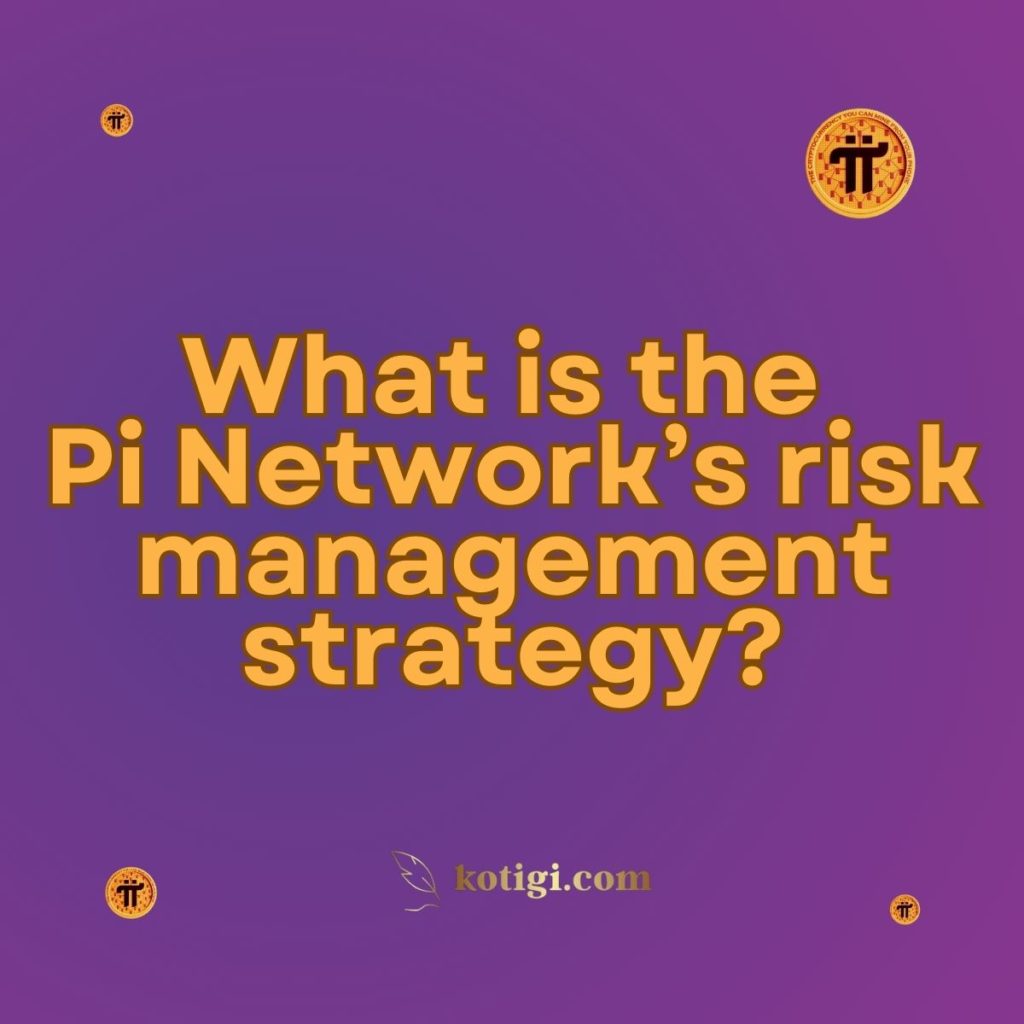
What is the Pi Network’s risk management strategy?
Pi Network’s risk management strategy focuses on addressing security risks, regulatory challenges, market volatility, and user privacy through community engagement, technological safeguards, and adherence to evolving regulations.
Introduction
As Pi Network continues to grow in the cryptocurrency space, managing risks effectively becomes crucial to its long-term success. Pi Network’s unique approach to mobile mining and its decentralized ecosystem attract millions of users worldwide, but with that growth comes various risks, such as security threats, regulatory uncertainties, and market volatility. In this post, we’ll delve into Pi Network’s risk management strategy and how the platform is mitigating the potential risks associated with operating a decentralized network. This analysis covers the platform’s approach to technological risks, regulatory compliance, privacy, and maintaining its user base.
Security Risks and Pi Network’s Approach
Security is a primary concern for any cryptocurrency platform, and Pi Network is no exception. A strong risk management strategy must prioritize safeguarding the platform from cyber threats, such as hacking, fraud, and data breaches.
Robust Consensus Algorithm
Pi Network relies on the Stellar Consensus Protocol (SCP), which is designed to provide security without the energy-intensive processes used by traditional proof-of-work systems like Bitcoin. The SCP protocol ensures that transactions are verified securely through a network of trusted nodes, reducing the risk of fraudulent transactions or double-spending.
Secure User Verification
To maintain the integrity of the platform, Pi Network has implemented a Know Your Customer (KYC) process to verify the identities of its users. This step not only protects against malicious actors but also ensures that the platform complies with anti-money laundering (AML) regulations. KYC verification strengthens the security of the ecosystem by minimizing the number of fake or bot accounts, making the network more reliable.
Protection Against Fraud and Hacking
Pi Network regularly updates its security protocols to protect users against hacking attempts, phishing scams, and other cyber threats. This includes continuous monitoring for suspicious activity and employing encryption techniques to safeguard user data. By maintaining a proactive approach to cybersecurity, Pi Network aims to prevent large-scale attacks that could compromise its network and user trust.
Regulatory Risks and Compliance
The evolving regulatory landscape surrounding cryptocurrencies presents significant risks for platforms like Pi Network. The uncertainty around regulations means that Pi must navigate compliance issues to avoid legal challenges in various jurisdictions.
Adapting to Global Regulations
Pi Network’s strategy involves staying ahead of regulatory changes in key markets. As cryptocurrency laws vary across regions, Pi Network’s legal team monitors global regulations closely and ensures compliance with local laws in areas like data protection, financial transactions, and taxation. The platform is focused on complying with the General Data Protection Regulation (GDPR) in Europe and adhering to AML requirements to mitigate legal risks.
KYC as a Regulatory Safeguard
The introduction of the KYC process serves not only as a security measure but also as a key component of Pi Network’s regulatory risk management strategy. By verifying the identities of its users, Pi Network aligns with global AML standards and helps prevent unlawful activities, such as money laundering or terrorism financing. This proactive compliance approach reduces the likelihood of regulatory scrutiny or penalties.
Market-Specific Compliance
In addition to global regulations, Pi Network tailors its strategy to meet country-specific legal requirements. This involves collaborating with legal experts in different jurisdictions to ensure that the platform adheres to the necessary financial and operational standards. By adopting a flexible approach, Pi Network is better equipped to expand its operations into new markets while managing regulatory risks.
Market Risks and Volatility
Cryptocurrencies are highly volatile, and market fluctuations can pose a significant risk to any blockchain project. Pi Network’s strategy aims to reduce the impact of market risks through sustainable growth, community engagement, and ecosystem development.
Controlled Supply of Pi Coins
One way Pi Network manages market volatility is through its controlled supply of Pi Coins. Unlike traditional cryptocurrencies that rely on mining rewards halving events, Pi Network adjusts its mining rewards based on the number of active users. This model ensures that Pi Coins are released into the market at a steady pace, preventing inflationary spikes and encouraging long-term stability.
Encouraging Real-World Use Cases
To mitigate the risks of market speculation, Pi Network emphasizes building a decentralized ecosystem where Pi Coins can be used for real-world transactions. By increasing the utility of Pi Coins through its marketplace and dApps, Pi Network encourages organic demand, which helps to stabilize its value over time. This reduces reliance on speculative trading and enhances the platform’s resilience to market downturns.
Engaging Community Participation
Pi Network’s strong community engagement also plays a critical role in mitigating market risks. By incentivizing users to participate in network security, development, and governance, Pi Network fosters loyalty and long-term commitment from its users. This active community engagement helps to buffer the platform against rapid fluctuations in user activity or market sentiment.
Privacy Risks and Data Protection
As Pi Network grows, protecting user privacy becomes increasingly important. Ensuring that user data is safeguarded from breaches or misuse is essential to maintaining trust within the community.
Data Encryption and Security Protocols
Pi Network employs data encryption techniques to protect sensitive user information, such as identification details submitted during the KYC process. This ensures that personal data is securely stored and protected from unauthorized access or data breaches. Pi Network also regularly updates its privacy policies and security measures to comply with the latest industry standards.
GDPR Compliance
As part of its commitment to user privacy, Pi Network ensures that its operations comply with the General Data Protection Regulation (GDPR), which sets strict guidelines on how personal data should be handled within the European Union. By adhering to GDPR, Pi Network demonstrates its dedication to protecting user privacy and avoiding legal risks related to data misuse.
Transparent Privacy Policies
Pi Network has adopted a transparent approach to privacy by providing clear, accessible information about how user data is collected, stored, and used. By maintaining transparency, Pi Network fosters trust with its users, who can feel confident that their privacy is being respected and protected.
Community and Governance Risks
A decentralized platform like Pi Network relies heavily on community governance and participation. Managing risks associated with community disengagement or governance challenges is critical to maintaining a functional and fair ecosystem.
Decentralized Governance Model
Pi Network has implemented a decentralized governance model that allows community members, known as Pioneers, to have a say in the platform’s development and decision-making processes. This inclusive approach ensures that the network reflects the values and needs of its users, reducing the risk of centralization or top-down governance issues.
Rewarding Active Participation
To keep its user base engaged and committed, Pi Network rewards active participation through daily mining sessions and referrals. This incentivization model not only increases user retention but also encourages the development of a loyal, long-term community, which is essential for the platform’s sustainability.
Addressing Community Concerns
Pi Network actively listens to its user base and responds to community feedback through updates and improvements. By maintaining open lines of communication, the platform can address potential concerns before they escalate, ensuring that the community remains engaged and supportive.
Conclusion
Pi Network’s risk management strategy is multi-faceted, addressing potential risks related to security, regulations, market volatility, and privacy. By leveraging robust security protocols, complying with global regulations, managing market risks, and ensuring data protection, Pi Network aims to create a sustainable and secure platform for its users. The platform’s strong community engagement and decentralized governance also play a pivotal role in mitigating risks and ensuring long-term success. As Pi Network continues to grow, maintaining a proactive and adaptive risk management strategy will be critical to navigating the evolving challenges of the cryptocurrency industry.
Key Takeaways:
- Security Risks: Pi Network uses a robust consensus algorithm and KYC process to protect against cyber threats and fraud.
- Regulatory Compliance: The platform adheres to global and regional regulations to mitigate legal risks, with KYC as a central regulatory safeguard.
- Market Volatility: Pi Network manages market risks by controlling the supply of Pi Coins and building real-world use cases to stabilize demand.
- Privacy Protection: The platform employs encryption and complies with GDPR to ensure user data privacy.
- Community Engagement: Pi Network’s decentralized governance and community incentives help manage the risks associated with user disengagement.




